

Secularisation Thesis. Should faith schools be banned. How Religious Restrictions Have Risen Around the World. Tenth annual report dives deeper into the ways government restrictions on religion and social hostilities involving religion have changed, from 2007 to 2017 Over the decade from 2007 to 2017, government restrictions on religion – laws, policies and actions by state officials that restrict religious beliefs and practices – increased markedly around the world.
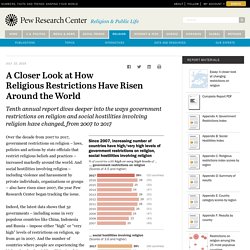
And social hostilities involving religion – including violence and harassment by private individuals, organizations or groups – also have risen since 2007, the year Pew Research Center began tracking the issue. Indeed, the latest data shows that 52 governments – including some in very populous countries like China, Indonesia and Russia – impose either “high” or “very high” levels of restrictions on religion, up from 40 in 2007. Secularisation terms, questions, quotes. “Religion will have no place in 22nd Century Britain!” Discuss (40) Secularism does not pose a threat to Christianity. Evaluate this statement. [40] Programmatic secularism is the policy of separating religious and public life, ensuring that the state is free of religious influence and leaving religion as a purely private matter for citizens.
![Secularism does not pose a threat to Christianity. Evaluate this statement. [40]](http://cdn.pearltrees.com/s/pic/th/secularism-christianity-188530803)
Both the USA and France are secular republics, which means that religious leaders have no place in government, religious holidays do not necessarily coincide with national holidays, religion is not taught in public schools and religious values are not necessarily reflected in legislation. By contrast, in the UK the Monarch is both the head of state and the head of the established Church. Bishops (and more recently other religious leaders) are represented in the House of Lords, giving them the opportunity to influence legislation. Religious holidays coincide with national holidays; Christmas Day will always be a Bank Holiday, as will Easter Monday. Religious broadcasting is protected by law; it only recently started to include non-Christian broadcasting and still does not feature Humanists. “Religion will have no place in 22nd Century Britain!” Discuss (40)
Secularisation. BBC Radio 3 - Free Thinking, Steven Pinker on Progress. The Battle For Christianity 2016 BBC Documentary HD. Documentary on the Marginalisation of Christians in the UK. UpFront - Would we be better off without religion? Just Pray. Peter Berger on the failure of the secularization hypothesis. Religion in the United Kingdom. Religion in Great Britain (2011 census)[1][2][3] Other religions (0.4%) Religion in the United Kingdom, and in the countries that preceded it, has been dominated for over 1,000 years by various forms of Christianity.
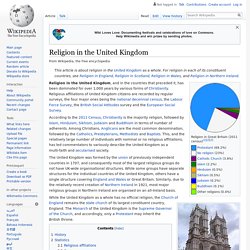
Religious affiliations of United Kingdom citizens are recorded by regular surveys, the four major ones being the national decennial census, the Labour Force Survey, the British Social Attitudes survey and the European Social Survey. According to the 2011 Census, Christianity is the majority religion, followed by Islam, Hinduism, Sikhism, Judaism and Buddhism in terms of number of adherents. Among Christians, Anglicans are the most common denomination, followed by the Catholics, Presbyterians, Methodists and Baptists. The United Kingdom was formed by the union of previously independent countries in 1707, and consequently most of the largest religious groups do not have UK-wide organisational structures.
History[edit] Statistics[edit] Religious affiliations[edit] Censuses[edit] To survive, Britain’s churches need to learn from our cathedrals. I believe that on Wednesday something odd happened.
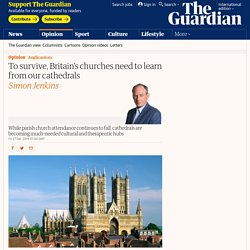
Probably 2.7 million people went to a Christmas service in their local Anglican church, a total that has risen steadily over the past decade. On Sunday, however, the number will plummet back to a weekly 700,000 and falling. Christian faith in the UK is in decline, with less than half of the population now believing “in God or a higher power”. Of these, just 15% claim to be “Church of England”, let alone go to church. Just 3%of 18- to 24-year-olds describe themselves as Anglican.
Danny Kruger - Maiden Speech (29/01/2020) A Quebec Ban on Religious Symbols Upends Lives and Careers. MONTREAL — A Muslim lawyer who wears a head scarf has put aside her aspiration to become a public prosecutor.
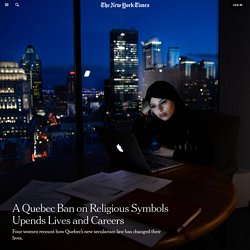
A Sikh teacher with a turban moved about 2,800 miles from Quebec to Vancouver, calling herself a “refugee in her own country.” And an Orthodox Jewish teacher who wears a head kerchief is worried that she could be blocked from a promotion. Since the Quebec government in June banned schoolteachers, police officers, prosecutors and other public sector employees from wearing religious symbols while at work, people like these three women have been grappling with the consequences. François Legault, the right-leaning Quebec premier, says the law — which applies to Muslim head scarves, Sikh turbans, Jewish skullcaps, Catholic crosses and other religious symbols — upholds the separation between religion and state, and maintains the neutrality of public sector workers. Eight arguments about whether the UK is a Christian country. UK secularism on rise as more than half say they have no religion.
The growth of secularism in the UK is unabated with fresh data showing stark generational differences and a new confidence among the non-religious to declare themselves atheist.
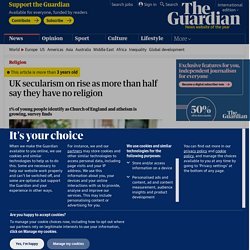
Only 1% of people aged 18-24 identify as Church of England, according to the British Social Attitudes (BSA) survey for 2018. A good week for the smiting of the ungodly. The professor did not take this conundrum well.
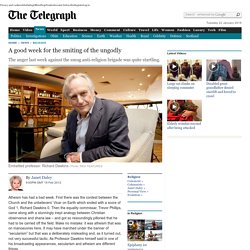
In fact, he exploded into vituperation on air and later attacked me in print for my impertinence. What he and his apostles (sorry, comrades-in-arms) seem not to recognise is the failure of imagination – the crass philistinism – of a position that fails to appreciate the significance of those kinds of belief that do not rest on empirical evidence but which are still central to human experience. To be so dismissive of, or incurious about, such beliefs – this capacity to envisage, or to long for, a transcendent explanation of our condition, which has been a feature of virtually every civilisation that has survived long enough to be recorded – is a very odd kind of obtuseness in people who clearly see themselves as possessing superior intelligence. Do they really not understand what it is that it is so unsatisfactory about “scientific” accounts which reduce life to the ticking over of sensory apparatus? If the question “why?” NSS urges lord chancellor to scrap Anglican judges’ service.
The National Secular Society has urged the lord chancellor to scrap the annual Anglican services which mark the start of the legal year, arguing that they undermine judicial neutrality.
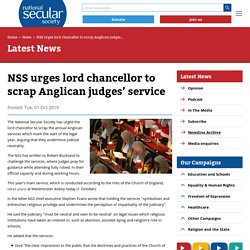
The NSS has written to Robert Buckland to challenge the services, where judges pray for guidance while attending fully robed, in their official capacity and during working hours. This year's main service, which is conducted according to the rites of the Church of England, takes place at Westminster Abbey today (1 October). In the letter NSS chief executive Stephen Evans wrote that holding the services "symbolises and entrenches religious privilege and undermines the perception of impartiality of the judiciary". He said the judiciary "must be neutral and seen to be neutral" on legal issues which religious institutions have taken an interest in, such as abortion, assisted dying and religion's role in schools.
He added that the services: Government fails to reveal full cost of services Other notes. How to survive a secular workplace. Should you attend a same-sex church wedding?

Understanding Unbelief – Understanding Unbelief is a major new research programme aiming to advance the scientific understanding of atheism and other forms of so-called ‘unbelief’ around the world. Welcome to the Understanding Unbelief programme website Understanding Unbelief is a major research programme aiming to advance the scientific understanding of atheism and other forms of so-called ‘unbelief’ around the world.
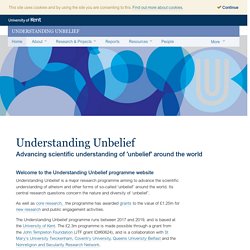
Its central research questions concern the nature and diversity of ‘unbelief’. As well as core research, the programme has awarded grants to the value of £1.25m for new research and public engagement activities. The Understanding Unbelief programme runs between 2017 and 2019, and is based at the University of Kent. The £2.3m programme is made possible through a grant from the John Templeton Foundation (JTF grant ID#60624), and is a collaboration with St Mary’s University Twickenham, Coventry University, Queens University Belfast and the Nonreligion and Secularity Research Network.
Voltaire factoid. Prime Minister Theresa May's Christmas message 2017. As we gather with our friends and family, I want to say thank you to all those whose service to others means they will be spending time away from their loved ones this Christmas. Men and women in our armed forces whose humbling bravery and daily sacrifices help to ensure the security of our nation and our allies around the world.
The heroes in our emergency services whose courage and dedication so inspired the nation in response to tragedy at Grenfell Tower and the abhorrent terrorist attacks in Manchester and London. But whose service saves lives in our communities every day, including Christmas Day. UK secularism on rise as more than half say they have no religion. Interview. "Look, this is a Christian country", says Hinds. But he adds that the cap on new faith schools' admissions should stay. Damian Hinds says that as Conservative Education Secretary, the post he has occupied since January 2018, “there are always arguments to be won”, and you have to face up to the “forces of small-c conservatism”.
He adds that “if you stand still, you will go backwards”. But Hinds, described by his fellow parliamentarians as a man who has entered the Cabinet on merit, has an aversion to extravagant language and cannot be regarded as a publicity seeker. In this interview, he sets out to show how reasonable his policies are. Tell Damian Hinds: Not in my name! We are not a ‘Christian country’. Prayers. The Queen, the Church and other faiths. The Secularisation Thesis – The Religious Studies Project. A new history of Christianity that upends Edward Gibbon.
Dominion By Tom HollandLittle, Brown, 624pp, £25/$32. Secularisation: is it inevitable? by John Coffey - Jubilee Centre : Jubilee Centre. Print or Download [By] the twenty-first century, religious believers are likely to be found only in small sects, huddled together to resist a worldwide secular culture. Secularism. 100-year-old church is transformed into a psychedelic art-covered skate park. A historic 100-year-old church that sat abandoned and decrepit for years in the Spanish municipality of Llanera, Asturias has undergone a fascinating transformation. It’s one that will draw a different kind devotion – those who subscribe to the religion of skateboarding. According to Colossal, a group of individuals led by the ‘Church Brigade,’ with help from online fundraising and collaboration with Red Bull, transformed the church into a public skate park called Kaos Temple. Now a second transformation is taking over, as artist Okuda San Miguel was commissioned to cover the walls and vaulted ceilings with bright, colourful, isometric paintings.
Photo by: Eduardo Rivas Image by: Okudart. I’m not surprised the secular Sunday Assembly didn’t work out. Extract: An Analysis of No Religion. Source. Attitudes of Christians in Western Europe. The majority of Europe’s Christians are non-practicing, but they differ from religiously unaffiliated people in their views on God, attitudes toward Muslims and immigrants, and opinions about religion’s role in society. Atheists Are Sometimes More Religious Than Christians. Greggs sorry for swapping Jesus for sausage roll in nativity scene - BBC Newsbeat. The Enlightenment of Steven Pinker – Opinion – ABC Religion & Ethics. Enlightenment and Progress, or why Steven Pinker is wrong - Theos Think Tank - Understanding faith. Enriching society.
Article - Secularism and Pluralism. Source. The myth of religious violence. As we watch the fighters of the Islamic State (Isis) rampaging through the Middle East, tearing apart the modern nation-states of Syria and Iraq created by departing European colonialists, it may be difficult to believe we are living in the 21st century.
What is Secularism? Extract - Religion and Secularism Karen Armstrong. Article - A Comparison between France and America. In this chapter, we will discuss different French and American approaches to religious minorities and to religion’s place in society. Summary - The God Delusion (Dawkins) Extract - God Returns to Europe. Article A Short History of Secularism in the West. Secularism - Quotes and Counter-points. Article - Secularisation and Romanticism. Extract - Vatican II on secularisation. Summary - Charles Taylor's A Secular Age (2007) Extract - A Summary of Charles Taylor's Secularisation Thesis.
Extract - Secular Morality and the New Atheism. Handout - Secularism. Extract An Evangelical responds to Secularism. Is The Internet Changing the Way People Feel About Religion? French teachers cut short Christmas film after realising it was about Jesus. Science, Religion, and Secularism XVI: Did Medieval Islamic Theology Subvert Science? Secularism. Campaign for secular education - National Secular Society. Humanists against Faith schools. Schools and education. Catholic Education Annual Report 2016. CatholicEducation - defence of faith schools. This House would ban faith schools. Education and Schools. The Big Debate: Should we still allow faith schools? -Epigram. What's the place of faith in schools? Richard Dawkins debates religion in public life. Beyond Belief, Faith Schools.
BBC Radio 4 - Moral Maze, Religious orthodoxy versus liberal values.